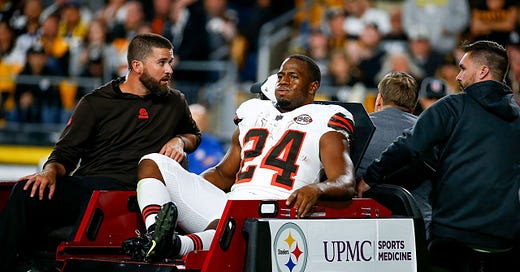“You can’t always control what happens to you, but you can control how you react to it.” – Unknown
Experiencing an injury is like experiencing an internal and external war. Battle after battle, fight after fight. Some days you win and some days, you inevitably lose. When you first get injured, you receive a rehab plan that usually looks linear. As you progress daily, you think each day you should improve and while wishful thinking isn’t a bad thing, it isn’t always realistic. Your progress during rehab will look more like a scatter plot as you may have some days where you feel like your old self again and the next day you may feel the worst you have felt during your injury process. That is the reality of experiencing injury! As we fight the daily battles, there will be many ups and down’s experienced as volatility is a part of the enduring challenge that is injury. In the ecosystem of sports, transformative rehabilitative training programs have literally changed the trajectory of careers, as sports performance tools and resources have gotten better on a yearly basis but the same cannot be said for mental health. Why not? Because physical health and mental health are seen as separate, when they are both deeply interconnected. When you experience an injury, of course the physical pain and trauma is evident but there aren’t any Band-Aids for disappointment, depression, and lost hope.
The mental side of injury is just as hard, and you must develop a mental rehab program and treat your mental health just as important as your physical health. While you are trying to improve physically, it will be the mental side of your humanity that will power you through to new heights and translate to physical healing. Mental rehab won’t look the same for everyone as some will go see mental health providers, some may speak with Player Care Specialists, and some may find other ways to develop intrinsic and extrinsic motivation, but a plan must be developed! Just as you receive a detailed physical rehab process, the same should be applied to your mental health, as this may be a more formidable barrier and substantial setback for some, especially depending on the injury. During your injury process, it will be a daily, silent, and lonely battle. I remember getting surgery for the first time, and not realizing how lonely it was going to be until it happened. I wasn’t around my teammates as I had a completely different schedule. I did not travel with the team, so on the weekends during game week I was in my dorm room alone staring at the ceiling, most mornings, wondering where things went wrong. I did not work on my mental health during this time because no one mentioned it and I couldn’t even recognize that I was just as depleted mentally as I was physically. Without awareness you can’t truly point out the issue. Developing a mental health rehab alongside your physical rehab will only make you stronger and build a growth mindset within you that will help you see challenges as opportunities. It is important to realize in your daily injury battle, that the choice is yours to fight your pain, both externally and internally, and the mindset to choose will only be molded by working on the mental side of the injury process. Keep fighting!





